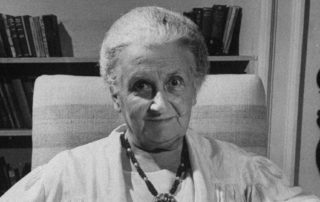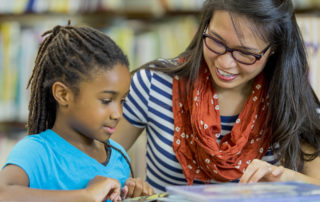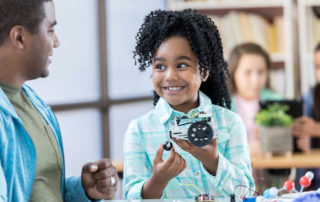Maria Montessori International Academy
Latest News, Events, and Articles
Latest News, Events, and Articles
Is it too early for 4-year-olds to learn how to read?
Does the idea of 4-year-olds learning how to read seem odd? How about 3-year-olds learning how to write? At Montessori schools, it's the norm. That's what Indianapolis parent Andrell Moore found out a few years ago. When Moore arrived at Maria Montessori International Academy to pick up his daughter at the end of a school day, the teachers gave him an unexpected surprise: a recording of the young girl reading an entire book for the first time. He was taken aback. “The thing about it was that was really surprising that it was before her 4th birthday,” Moore recalled. “It was priceless. Normally, you would have to be attending super expensive academies to receive that type of education. What they were able to provide my daughter was really priceless.” Moore’s child wasn’t the only student at MMIA who learned to read at the ages of 3 and 4. Since
Why Does Your Child Hate School?: 5 Reasons to Consider
If your child seems to hate school, dreads getting up in the morning on school days or constantly pretends to be ill, don't ignore this type of behavior. You shouldn't consider it "natural" for your child to hate going to school. When the classroom is stimulating, engaging and welcoming, most children look forward to going to school. Based on numerous studies, your child may be facing challenges in several areas that make attending class an uncomfortable experience. Here are 5 reasons you should explore: 1. Poor performance with math. Don't underestimate the frustration your child has with math. If a child is performing poorly in this subject area, there's a good chance he will struggle in other subjects, according to a recent report published in The Washington Post. That study revealed that many students struggle with academic performance in reading and other subjects — primarily because they struggle with math. According
Read Our Top 10 Montessori Quotes for Inspiration
As she was with her teaching methods, Dr. Maria Montessori is memorable for her inspiring quotes. Many of them are based on her research and observations that shaped the life-changing philosophies of the Montessori Method. Over the course of many years, Dr. Montessori shared her insights in books and lectures around the world. No matter who you are in the life of a child — as a parent, teacher, friend or relative, we’re sure you’ll find our Top 10 favorite Maria Montessori quotes truly inspiring. Please share a few of your own favorite Montessori quotes with us! Here they are … our top 10 Montessori quotes! "The child has a mind able to absorb knowledge. He has the power to teach himself." “A child who has become master of his acts through long and repeated exercises, and who has been encouraged by the pleasant and interesting activities in which he
A biography of Maria Montessori
By Vivian Cain Dr. Maria Montessori was a pioneer in education during the early 1900’s. Born in a time when women were not allowed in the field of medicine, she broke down barriers to become a respected physician and moved on to developing innovative methods for teaching young children. Overcoming Obstacles When Maria reached the age of 13 she had already started to overcome the first challenges she’d experience as a student. She attended an all-boys technical school—having qualified as an applicant based on exam scores. While her father encouraged her to pursue a career in engineering, she had her heart set on becoming a doctor. After applying to Rome’s medical school—she was rejected, but never discouraged. She continued to educate herself in the field of medical science and was admitted after persevering through challenges. Discovery Upon her completion of medical school in 1896, Dr. Montessori began practicing psychiatry. She
Why Montessori teachers follow the child
By Vivian Cain One of Dr. Maria Montessori’s core tenets was the directive to “follow the child.” In the classroom, this means allowing your child to experience and engage in activities that interest them. But more importantly, it means resisting the urge to lead the child. Montessori-certified teachers are trained to practice this principle every day. Unlike teachers in traditional classrooms, the Montessori teacher is not the primary focus for the students. Rather, the teachers are intently focused on each child’s activities and provide assistance to help them learn. If you’re considering a Montessori education for your child, it’s important to learn more about the Montessori teacher’s role in the classroom. Montessori principles are designed to encourage children to explore their natural desire to learn, not to make teachers teach. To facilitate your child’s learning, a Montessori school should be designed as a comfortable environment in which your child feels
Explore why Montessori works for infants
By Vivian Cain Montessori education for infants? Absolutely. When studying children’s development more than 100 years ago, Dr. Maria Montessori, saw the principles of discovery and learning at work in newborns. Dr. Montessori, the founder of one of the leading educational philosophies of this century, saw the benefits of surrounding infants with a calm, nurturing and safe Montessori environment. Here are some of the observations of a Montessori education for infants. Movement. Babies need movement in order to experience the world around them. A Montessori setting provides a safe place for your infant to move about, whether they’re just beginning to walk or haven’t yet mastered crawling. At this stage, infants are learning to control the movement of their hands and feet, support their hands and develop hand-eye coordination. Mastering their coordination and movement is the first step in exploring the world around them and developing sensory skills. At Maria
Make room when your child says, “I can do it myself!”
By Vivian Cain Young children are naturally interested in doing the things they see others do. Sometimes it’s challenging to be patient with your toddler or preschooler as they learn the everyday skills they need to become independent. Children want to pour their own drinks, but the cups are stored out of reach. They want to dress before they completely understand how to dress for the weather. They want to zip their own coats, but you’re in a rush and want to get out the door quickly. However, enabling your toddler or preschooler to do these things on their own has incredible short- and long-term benefits. When children feel more independent and able to do things on their own, they no longer feel the need to fight for control. You also may find that emotional meltdowns become less frequent. The Montessori education philosophy includes a strong focus on independence and
How a multi-age classroom provides multiple learning benefits
By Vivian Cain One of the most striking differences between a Montessori school and a traditional school format is the multi-age classroom setting. For those unfamiliar with the Montessori environment, it can be a bit perplexing to envision your child in a classroom with younger and older students. One of the core beliefs behind the Montessori philosophy is that learning isn’t restricted by age but rather your child’s learning pace, interests, and personal development. This means that not only will your child learn social skills and unique perspectives they wouldn’t normally be exposed to in a traditional classroom, they will benefit from the following advantages of a multi-age classroom. Leadership skills. If your child is older, you may worry that younger children in the classroom will distract your child or that the younger children will receive more attention and assistance. If your child is younger, you may be concerned that
Bring the Montessori philosophy home in 5 key ways
By Vivian Cain Every parent knows that learning doesn’t start and stop at the classroom door. Your involvement in your child’s education is critical to their success. You can broaden your child’s learning experiences by setting up a small Montessori-inspired space in your home where your child can practice the concepts learned at school. While incorporating a Montessori environment into your home is especially helpful for toddlers and preschoolers, it can be helpful at any level. Start with a small space. For many families or frequent visits to grandmother’s house, a small space would be ideal. Set up a child-sized table and chairs and make sure materials are easily accessible with low wood shelving and storage. Perhaps, even designate one cabinet or drawer for your child’s own real dishes and supplies. Low shelving is important in helping your child operate independently. If your space only allows for one small shelf,










